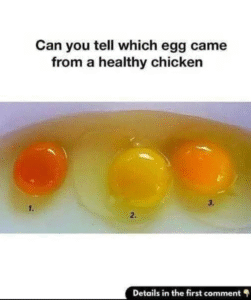
How to Tell If an Egg Came from a Healthy Chicken: 6 Signs of Superior Quality
Not all eggs are created equal. Whether you’re buying them at the store or collecting them from your backyard coop, certain clues can tell you if an egg came from a healthy, well-cared-for chicken. Superior quality eggs don’t just taste better — they are also more nutritious and safer to eat. Here are six telltale signs that your egg came from a healthy hen:
1. Strong, Thick Shell
The shell is the egg’s first line of defense. A thick, hard shell indicates the chicken had enough calcium and other essential nutrients in its diet. Thin or brittle shells may suggest the hen was nutrient-deficient or under stress. Healthy hens fed a balanced diet with access to the outdoors typically lay eggs with shells that are smooth, firm, and strong to the touch.
2. Rich, Bright Yolks
Color matters. A deep orange or golden yolk is a key indicator of a healthy chicken’s diet, often rich in greens, insects, and natural grains. Pale yellow yolks usually suggest a factory-farmed chicken with limited diet diversity and little or no time outdoors. The richer the yolk color, the more carotenoids and healthy fats it likely contains — both signs of superior nutrition.
3. Firm, Bouncy Whites
The egg white, or albumen, should be thick and firm, with a clear separation between the thicker inner white and the thinner outer layer. If the whites are watery or runny, it could be a sign the egg is older or that the hen was in poor health. High-quality eggs from healthy chickens usually have whites that hold their shape when cracked into a pan.
4. No Off Odors
A fresh egg from a healthy hen should have no smell at all. If you detect a sulfur-like, musty, or “off” odor when cracking an egg, it could indicate spoilage, bacterial contamination, or internal rot — all signs that something went wrong with the chicken’s health or environment.
5. Clean, Uncracked Appearance
While cleanliness alone doesn’t guarantee quality, an egg that’s relatively clean and free from excessive dirt or droppings suggests good coop hygiene and attentive care. Cracks, stains, or sticky spots can allow bacteria in and are often signs that eggs weren’t handled or collected properly, or that the hens may be overcrowded or stressed.
6. Local or Pasture-Raised Labels
If you’re buying from a store, read the label. “Pasture-raised” or “organic” eggs often (though not always) come from chickens given better living conditions. Backyard or farmers’ market eggs tend to be more trustworthy, especially if you know the source. Happy, healthy hens produce more nutritious, better-tasting eggs — and it often shows in the quality.
In short, the best eggs reflect the well-being of the hens that lay them. With a little knowledge and close observation, you can spot superior eggs — and enjoy the flavor and benefits that come with them.
